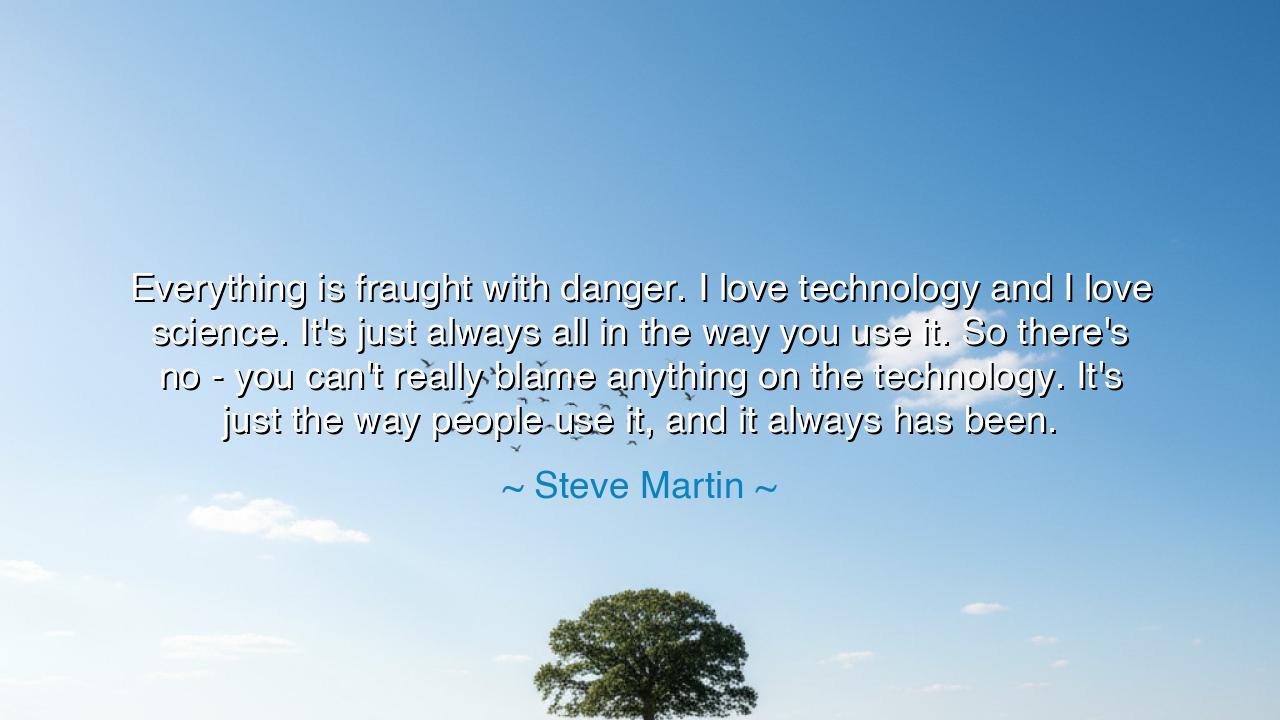
Everything is fraught with danger. I love technology and I love
Everything is fraught with danger. I love technology and I love science. It's just always all in the way you use it. So there's no - you can't really blame anything on the technology. It's just the way people use it, and it always has been.






Hear then, O seeker of wisdom, the words of the jester who spoke with the gravity of a sage. Steve Martin once declared: “Everything is fraught with danger. I love technology and I love science. It's just always all in the way you use it. So there's no – you can't really blame anything on the technology. It's just the way people use it, and it always has been.” Though clothed in the simple attire of comedy, his saying carries the fragrance of eternal truth. For he reminds us that the creations of human hands—be they tools of stone, fire, or lightning—are neither holy nor wicked in themselves, but bend toward the will of those who wield them.
Long ago, in the dawn of mankind, the discovery of fire was met with both terror and wonder. To the one who embraced its warmth, it became the guardian of the night, the protector against beasts, the herald of cooked bread. Yet to the one who knew not discipline, it devoured homes, forests, and cities, leaving only ashes in its wake. Was the fire to be condemned? No—only the hand that misused it bore the blame. Thus, from the first flicker of flame to the glowing screens of our age, the truth remains unchanged: technology is innocent, the heart of man decides its fate.
Consider also the tale of Alfred Nobel, who devised dynamite to aid in the breaking of rock, to carve paths for roads, tunnels, and bridges. His invention was meant to uplift, to make labor swifter and life easier. Yet men took that power and turned it to war, tearing the earth with explosions and staining the soil with blood. Nobel, stricken by sorrow, sought redemption through his legacy, birthing the Nobel Prizes, that the fruits of knowledge and peace might outshine the shadows of destruction. Here we see Martin’s wisdom reflected: it was never the dynamite that was guilty, but the choices of humankind.
The ancients have always known this law of balance. The sword, sharp and unyielding, is but metal until a man takes it in his hand. With it, one may defend the helpless, carve justice into the world, or, with cruelty, enslave and destroy. So too with the printing press: it spread holy scriptures and wisdom across the world, yet also became a vehicle for lies, propaganda, and the spread of hatred. These twin truths march always side by side, reminding us that power is neutral until it is steered by intent.
Martin speaks with love for science and technology, for in them lies infinite potential. The telescope extends the eye to the stars, the microscope reveals hidden universes in a drop of water, the electric current carries voices across oceans. To despise such wonders would be folly. Yet to adore them blindly, without wisdom, is also folly. The sage’s warning is clear: love the tool, but beware the hand that directs it. For in every gift lies the seed of peril, and in every peril, the seed of redemption.
What then shall the listener take from these words? The lesson is thus: let not your heart fall into the laziness of blaming the tool for the deeds of the craftsman. Look instead to the will, the virtue, and the discipline of the user. In your own life, ask not “Is this technology good or evil?” but rather, “What purpose does it serve in my hands? Does it bind me, or does it free me? Does it heal, or does it harm?” For every device, from the humble hammer to the dazzling circuit, bows to the morality of its keeper.
Therefore, O children of tomorrow, walk wisely among the inventions of your age. Do not curse the machine, nor worship it, but cultivate within yourself a noble spirit that guides it rightly. Use technology to learn, to build, to connect, to ease burdens, and to give voice to the voiceless. Resist the temptation to wield it in greed, cruelty, or sloth. For the danger lies not in the shining tool, but in the shadowed depths of the human soul.
And so let Steve Martin’s jest echo as a prophecy: “It’s just always all in the way you use it.” If you would be remembered as a builder and not a destroyer, let your actions sanctify the tools you hold. Live with vigilance, with wisdom, with purpose. For though everything is fraught with danger, it is within your power to shape that danger into light.






AAdministratorAdministrator
Welcome, honored guests. Please leave a comment, we will respond soon